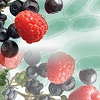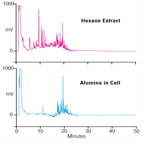Find methods for your needs
Refine by Feature
Displaying 1-4 of 4 results for Tag: PCB Congener
AN359: Extraction of Contaminants, Pollutants, and Poisons from Animal Tissue Using Accelerated Solvent Extraction (ASE)
Instrument Type: Automated Sample PrepAccelerated Solvent Extraction (ASE) uses solvents at elevated temperatures and pressures to extract organic materials from solid and semisolid samples in a fraction of the time required by traditional extraction procedures. This Application Note details procedures for extracting the following contaminants from animal tissues: Dioxins/Furans, Polybrominated Flame Retardants (PBDE), PCBs, pesticides, PAHs, and organo-tin.
AN322: Selective Extraction of PCBs from Fish Tissue Using Accelerated Solvent Extraction
Instrument Type: Automated Sample PrepThe analysis of extracts containing polychlorinated biphenyl (PCB) contaminants from fish tissue and fish homogenates can be hindered by the presence of coextracted fatty materials. Here demonstrates that selective extractions can be performed using accelerated solvent extraction with the proper choice of solvent and sorbent in the extraction cell. Results are given for the recovery of PCBs from contaminated fish tissue showing that extracts do not require further cleanup prior to analysis by gas chromatography when using accelerated solvent extraction.
AN316: Extraction of PCBs from Environmental Samples Using Accelerated Solvent Extraction
Instrument Type: Automated Sample PrepAccelerated solvent extraction is an extraction method that significantly streamlines sample preparation. PCBs are found in many solid waste materials. This AN describes the application of accelerated solvent extraction to the extraction of PCBs from sewage sludge, river sediments, marine sediments, and oyster tissue. The procedures described in this AN meet the requirements for sample extraction of solid samples as determined by U.S. EPA Method 3545.
CAN121: Determination of Polychlorinated Biphenyls (PCBs) in Soils and Solid Waste by Accelerated Solvent Extraction and GC-MS/MS
Instrument Type: GCMSMSPolychlorinated biphenyls (PCBs) belong to a broad family of synthetic organic chemicals known as chlorinated hydrocarbons. In the United States, PCBs were produced from 1929 until their manufacture was banned in 1979.Although all 209 of the PCB congeners can be synthesized, only about 130 individual congeners have been identified in commercial PCB mixtures at concentrations ≥ 0.05%. The method reported here is applicable for the determination of 32 of the 209 possible PCB congeners in soils, including the dioxin-like PCB (“non-ortho”,“mono-ortho PCB”, and “di-ortho PCB”).




